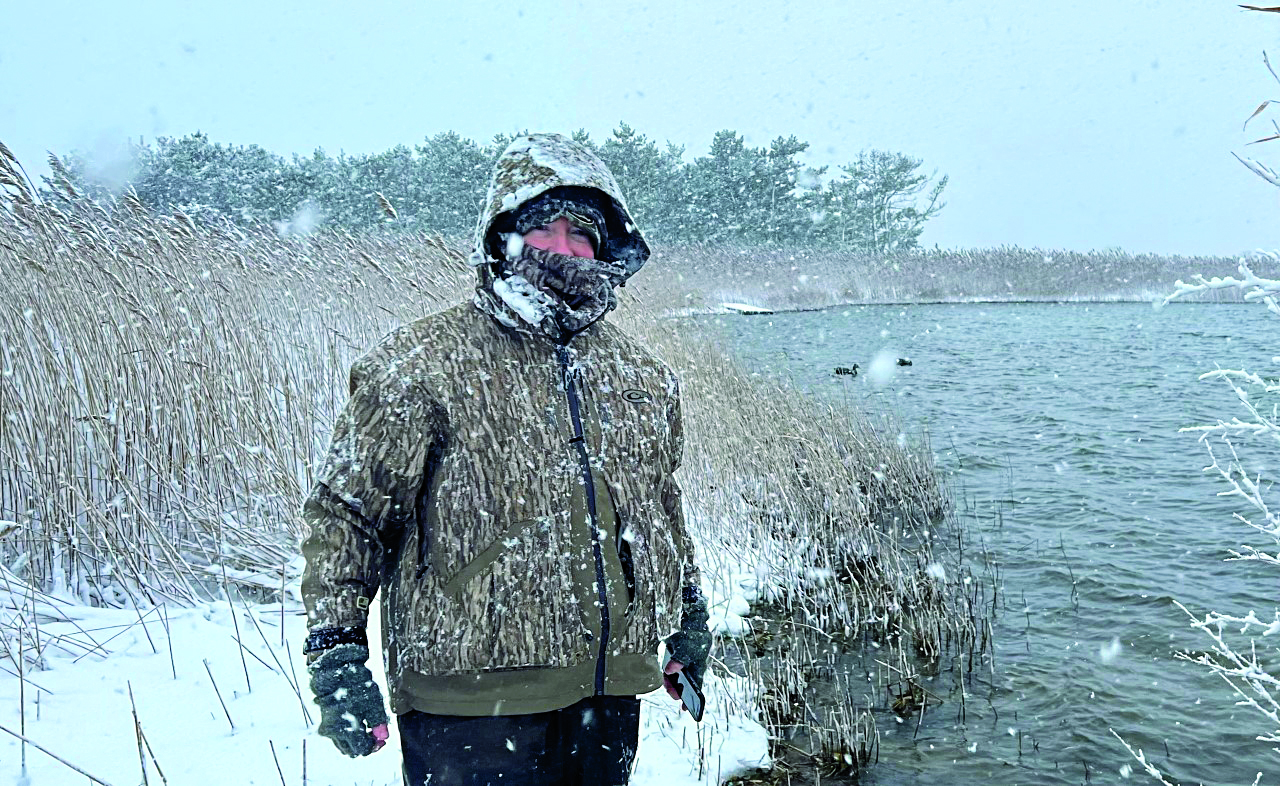For the Ducks: Duck Blind Reflection
For those of us who appreciate nature’s gifts, there’s never a slow day in the outdoors

Adam Putnam during a duck hunt on Long Island, New York, this past season.
Another waterfowl season has come to a close as I write this column. Our dry, cracked hands have begun to heal, we’ve mostly put our gear away, and our lists of things that we have put off until after the season await.
Given the severity of the multi-year drought on the prairies, where most ducks hatch, it was a difficult year for many hunters. The birds we saw were older, wiser, and less impressed with our bag of tricks. Hunters who had a pretty good season are keeping their mouths shut for fear of the word getting out before next season. This has been a typical end-of-season reflection for most of DU’s 85 years: were the ducks where I wanted them, on the days I was there, and how many times did I get my limit?
Over these eight and a half decades we have conserved more than 15 million acres of habitat, primarily for waterfowl but also for hundreds of other wildlife species and humankind. We have restored mangrove swamps and built terraces along the Gulf Coast, and these habitats have made a measurable difference in storm resilience. We have partnered on public lands to open new areas to hunt but also to camp, hike, fish, and disconnect ourselves and our children from the virtual world, which can’t hold a candle to the natural one. In Canada, we still invest in the prairies, but over the last 20 years we have also worked in the Boreal Forest, which is nature’s backup plan for waterfowl survival when the prairies are dry.
In places where many people don’t think about ducks, like Long Island, New York, or the Central Valley of California, we have restored wetlands near urban areas and have even helped to broker drought-necessitated peace accords among competing interests. In other words, we’ve accounted for the millions of ducks that nest, migrate, winter, and return north again to the breeding grounds. But have we accounted for the cleaner water, sequestered carbon, and more resilient and beautiful places that we have conserved, all because we cared enough about ducks to do our part and make a difference? These other benefits fall under the umbrella of “sustainability,” and we are paid to provide them, which is good for the ducks.
I had some slow days of hunting this season. But it was on those days when I didn’t even pull the trigger that I studied the bait balls of blackbirds shape-shifting across a marsh. I even confess to having marveled at a “goosenado” of snows, knowing that they can be a nuisance yet awe-inspiring in their sheer numbers. Those experiences make me wonder what a prairie full of bison must have looked like from a train car window, or flights of passenger pigeons darkening the skies for days, or mangroves decorated with plumed herons and egrets. On those slow days you realize that, thanks in part to our efforts, waterfowl have not gone the way of the bison or the passenger pigeon or scores of other animals whose populations have shrunk or disappeared from the landscape.
Yes, I had amazing moments this season too, when the wind and sun cooperated, when the spread must have looked perfect from above, when a cold front delivered new birds that chose the same real estate that I did on that particular day. Those are the days our minds return to, and memories of those days keep us getting up early, breaking ice, dunking decoys, and squinting into the snow.
This spring we are proud to present our 2022 Travel Issue, and we showcase some great places our team was able to visit despite the latest Greek-letter covid variants. We hope you’ll be able to get out too, visit friends and family, and stay healthy this year. One trip to consider will be the second annual Ducks Unlimited Expo, or DUX. Once again, we will be at Texas Motor Speedway in Fort Worth with all the outdoor toys for you to shoot, cast, drive, and buy. Last year over 40,000 people attended, and we hope to see you there on April 8−10. For more information, visit duckexpo.com. We also hope you’ll join us to celebrate our 85th anniversary at our national convention in New Orleans on July 13−16. You can register and learn more at convention.ducks.org.
We’ve been through a lot together the past couple of years. But it’s amazing what you can get through— and accomplish— when you stick together. Together, we are making a difference for more than just a season.
From the March/April 2022 issue of Ducks Unlimited magazine
